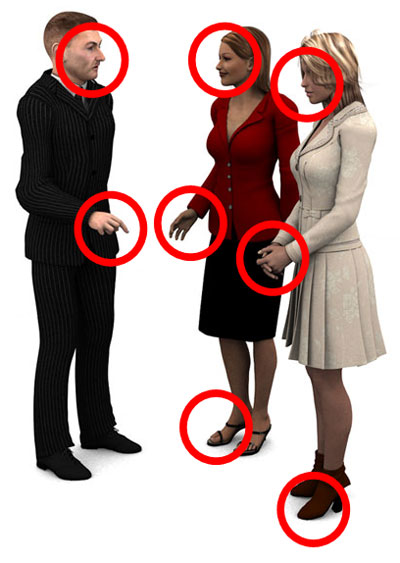Guest Author
Aaron Newbold is a communications specialist that helps individuals through the job search process. He currently writes on employment related topics from resumes to personal online branding for Resume Edge.
The time to take account of your body language shouldn’t happen once you sit down for the interview. By that time your body has sent enough cues for the interviewer to have a pretty good indication of the kind of person you are. Before you even meet, the hiring manager will look at your face, hair, dress and image and develop a first impression.
When you greet the interviewer, offer them a smile and maintain eye contact. Relax. Many candidates tense up their bodies and face when they enter the interview. Offer a firm palm to palm handshake that is not too strong or too weak. When you take a seat, place your briefcase or purse on the floor or in another appropriate place. Be careful not to place them on your lap or the table.
You want your body language to convey power and confidence. By paying attention to the following tips, you will ensure your body is sending the right message.
Posture
Try to maintain a posture that is upright and neutral. Leaning back may send the message that you are arrogant or lazy, while leaning to far forward appears aggressive. And never slouch. Sit tall and relax. It sends the message that you are in control and confident.
Eye contact
Although it may feel uncomfortable, maintain eye contact for an extra second. This is especially important when shaking hands. Most of naturally want to break off eye contact once a personal connection has been made.
Looking up or shifting your eyes may indicate to the interviewer that you are unsure of yourself, or worse yet, lying. Maintain direct eye contact. Practice on yourself in the mirror at home. While practicing your interview answers, work on maintaining eye contact with yourself.
One word of caution, although it is important to maintain eye contact and look confident, staring at someone for an extended time makes them feel uncomfortable.
Hand and arm gestures
Gesturing is a natural part of communication. It shows that you are expressive and enthusiastic. It is a good way to show you are relaxed and in control. But keep a balance. Don’t overdo gestures or hide your hands.
Don’t point your fingers or make sharp movements with your hands. This comes across as being aggressive. Ever watch a President give a speech? They never point or make quick chopping motions with their hands. Instead, if making a point, keep the fingers bent and the movements relaxed.
Refrain from keeping your hands behind your back. You may think this will help keep you from fidgeting but it has the effect of making you look stiff. The same goes for keeping your hands in your pockets. Leave your hands at your side and ready to gesture as appropriate.
Also avoid crossing your arms is a sign of defensiveness or resistance. Leaving them at your sides makes you appear more approachable.
Nodding
Don’t be overly agreeable. Nodding once or twice is fine, but nodding too much is distracting and makes us appear less powerful.
Nervous energy
Fidgeting is a distraction to the interviewer. Biting at a hangnail or jostling coins in your pocket takes the attention off what you are saying. Also avoid touching your face and hair.
Remember the importance of first impressions. Working on your body language is as important as working on the interview questions. Take time to practice entering and leaving a room. Consider where you will put your briefcase or purse and how you will greet the interviewer. Preparation for an interview calls for more than knowing how to answer questions. By being aware of what your body is saying, you can enter the interview with more confidence.


